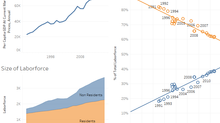Beyond the Tools: Why Data Training Must Focus on Foundational Skills

A Misalignment in Data Training Investments
Organizations worldwide have poured significant investments into data training programs, focusing heavily on peripheral data skills such as data management, visualization, and programming. These investments align with the latest industry trends and tool launches—Tableau, Power BI, Python, R, SQL, Hadoop, Matplotlib, NumPy, and more.
However, despite the widespread adoption of these tools and skill sets, many companies are left disappointed with the return on investment (ROI). They see little improvement in data-driven decision-making and business impact despite an increase in employees with data-related skills.
The Unspoken Gaps in Data Training
The problem isn't with the tools or the skills themselves—these are valuable and necessary. The issue is that they are often treated as a complete solution, when in reality, they are only part of the equation.
Peripheral data skills are designed to empower data analysts who already have a strong foundation in data-driven thinking. But when professionals lack this foundation, even the best visualization or the most optimized SQL query won’t lead to meaningful insights or strategic action.
Additionally, these skills have a short shelf life. New tools emerge rapidly, replacing old ones. This constant churn means that professionals who only specialize in specific tools must continuously reskill to stay relevant. Organizations, in turn, must continuously reinvest in training programs—without necessarily seeing long-term improvements in decision-making or business performance.
The overlooked reality? Foundational data skills—which have stood the test of time—remain crucial, even in today’s AI-driven landscape. Without these, organizations cannot fully realize the value of data.

The Enduring Value of Foundational Data Skills
To truly maximize the value of data, organizations must balance their investment in peripheral and foundational data skills. These foundational skills have long been critical in analytics and remain indispensable today:
Business Acumen – A deep understanding of business operations and industry dynamics allows professionals to define the right problems for analytics and interpret insights effectively. Without business context, even the best data analysis lacks relevance.
Critical Thinking – The ability to question assumptions, identify biases, and differentiate between signals and noise is key to extracting true value from data.
Problem-Solving – Data is only useful when it leads to actionable insights. Problem-solving skills enable professionals to translate analytical findings into strategic decisions. This is distinct from simply identifying statistically significant patterns.
Math & Statistics – Before “Analytics” became a buzzword, the field was called Statistics. While a master’s degree in Math isn’t necessary, professionals must understand basic statistical principles to make informed decisions and avoid misinterpretations.
Data Storytelling, Communication & Influence – One of the most overlooked yet crucial skills in the data value chain. It’s not enough to analyze data; decision-makers need to understand what the data is saying, why it matters, and what actions should be taken.
These foundational skills continue to be highly relevant in the age of AI. Business acumen is essential in knowing what problems AI should be deployed for and ensuring alignment with business objectives. Critical thinking is necessary to evaluate AI outputs, identify biases, and determine when AI-driven insights are valid or misleading. Problem-solving helps professionals maximize AI’s potential while recognizing its limitations. Finally, strong data storytelling skills are crucial in securing buy-in for AI adoption and integrating AI into business value chains effectively.
Unlike peripheral data skills, which are widely available in today’s job market, talent with strong foundational data skills is much harder to find. Even more scarce are professionals who combine foundational expertise with modern data tools. Organizations that can develop and retain these individuals will hold a strong competitive advantage.
Call to Action: Build Sustainable Data Capabilities with FYT Consulting
Organizations serious about realizing tangible value from their data investments must rethink their approach to data training. Understanding the full data value chain and equipping teams with both foundational and peripheral data skills is the key to success.
At FYT Consulting, we specialize in bridging the data skills gap. Our training programs focus on equipping professionals with the foundational competencies necessary for long-term success, while also integrating modern tools to ensure immediate impact.
If your organization is ready to move beyond surface-level data training and build sustainable data capabilities, let’s have a conversation. Contact FYT Consulting today to explore how we can help your team leverage data for real business value.


























Comments